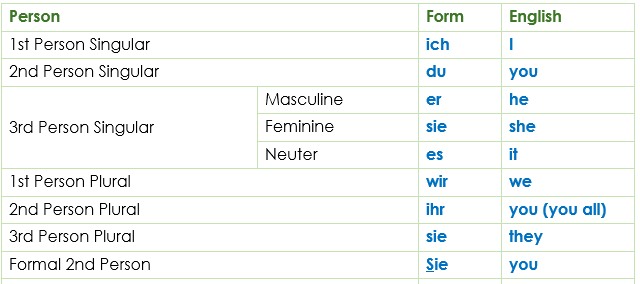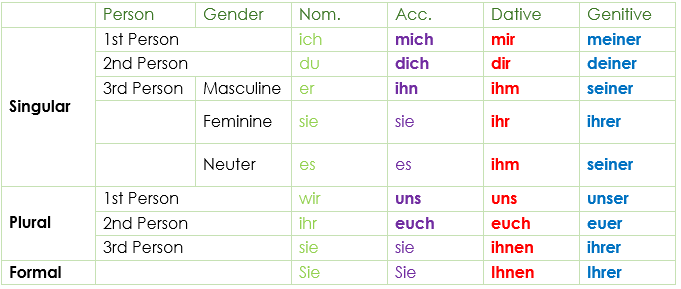What are Personal Pronouns? (Personalpronomen)
We use Personal pronouns to replace names we've already mentioned, to talk about ourselves or someone or something else.
Examples:
- „Er sieht ihn.“
- „Sie sieht es.“
- „Wir sehen sie.“
What information do German Personal Pronoun have?
Personal Pronouns show the Gender (Masculine, Feminine, Neuter), the Number (Singular / Plural) and the Case (Nominative, Accusative, Dative, Genitive) of the noun they represent, and you have to decline them.
Examples:
- „er“ = 3rd person, Masculine, Singular, Nominative
- „wir“ = 1st person, Plural, Nominative
- „es “ = 2nd person, Neuter, Singular, Nominative
- „ich“ = 1st person, Singular, Nominative
The Different Forms

- „du/ihr“ = informal
(used with friends, family, and in informal situations)
- „Sie“ = formal / polite form
(used with bosses, strangers, and in formal situations)
Comparison to English
We have to decline Personal Pronouns as well.
Example:
- „Das ist Max. Er spielt gerne Fußball.“
- „Ich mag ihn.“
- „Ich schenke ihm einen Ball.“


Are you still having problems with the German cases?
If the German cases still cause you great difficulties, I now have the solution for you!
After you read my book/ebook: „Nominative, Accusative, Dative or Genitive? - No Problem!“ you'll even be able to explain the cases to your friends! Guaranteed - or you'll get your money back!

Use of the Different Personal Pronouns
Personal Pronouns - 1st Person (ich, wir)
We speak in the 1st person when we talk about ourselves.
- „Ich gehe nach Hause.“ - „Mir ist kalt.“
- „Wir machen immer unsere Hausaufgaben.“ - „Uns ist das wichtig.“
Personal Pronouns - 2nd Person (du, ihr, Sie)
We speak in the 2nd person when we address someone. "Du" and "ihr" are the informal versions, while "Sie" is the formal version. Grammatically it corresponds to the 3rd person plural, bbut it always capitalized.
- „Du wirst heute dein Zimmer aufräumen.“ - „Ich werde dir helfen.“
- „Habt ihr eure Deutsch-Hausaufgaben schon gemacht?“ - „Was war besonders schwer für euch?.“
- „Können Sie mir bitte helfen?“ - „Ja, natürlich kann ich Ihnen helfen."
Personal Pronouns - 3rd Person (er, sie, es)
In the 3rd person, we speak about other things or people. Usually, these have been named before, and it is clear who or what we are talking about.
- „Marcel ist in Luisa verliebt?“ - „Er geht heute mit ihr ins Kino."
Summary
- Personal Pronouns replace persons or things.
- They are used to avoid having to use the name of the person or object all the time.
- If the noun replaced by the Pronoun isn't obvious (i.e., two nouns with the same gender), you should use the noun itself. The pronoun otherwise could cause misunderstandings.
Gramato: Your German Grammar Coach
Try Gramato now!
Powered by EasyDeutsch AI

This is how Gramato can help you!
Gramato helps you with all your German grammar questions – fast, to the point, and always based on the trusted content from https://easy-deutsch.com.
Gramato offers fill-in-the-blank exercises on a variety of grammar topics, tailored to your level so you can practice exactly what you need.
Get answers in multiple languages – German, English, Spanish, French, and more. That way, you can understand grammar in the language you feel most comfortable with.
Clear and simple grammar explanations – so you can learn faster and smarter with Gramato.
Ask your questions or practice anytime with Gramato – no wait, just results!
Related Topics:
Entire lesson in German only: Personalpronomen
More lessons on Pronouns:
- Was sind Pronomen? (What are Pronouns?)
- Possessivpronomen (Possessive Pronoun)
- Reflexivpronomen (Reflexive Pronoun)
- Demonstrativpronomen (Demonstrative Pronoun)
- Relativpronomen (Relative Pronoun)
- Indefinitpronomen (Indefinite Pronoun)
- Pronomen „es" (Pronoun "es")
Pronouns have to be declined. Therefore, you must also be familiar with the declension and the deutschen Fällen (German Cases):
You can find an overview of all topics under German Grammar.
Recommendation: Free video lessons every Tuesday & Thursday
Sign up now: Email German Grammar course


